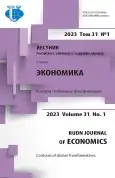Defining trends in the evolution of the Russian gas market
- Authors: Allayarova N.I.1, Ketsba B.I.2
-
Affiliations:
- Samara State University of Economics
- Russian Customs Academy
- Issue: Vol 31, No 1 (2023): CONTOURS OF GLOBAL TRANSFORMATIONS
- Pages: 30-48
- Section: INDUSTRIAL ORGANIZATION MARKETS
- URL: https://journal-vniispk.ru/2313-2329/article/view/324340
- DOI: https://doi.org/10.22363/2313-2329-2023-31-1-30-48
- EDN: https://elibrary.ru/RRHVLW
- ID: 324340
Cite item
Full Text
Abstract
The new “driving force” of the liberalization of the conditions for the functioning of the gas sector associated with demonopolization and the formation of an effective structure of the domestic gas market with a high level of competition and fair principles of the organization of natural gas trade for Russian consumers are the ongoing changes in the economic situation in the global energy market. Against the background of the expected decline in pipeline gas exports to Europe (the volume of decline may amount to 100 billion cubic meters in the medium term) it is important to focus efforts on the development of the domestic gas market, since the task in these conditions is more urgent than ever. First of all, to accelerate the transition to market pricing mechanisms (except for the population) using indicative prices on the stock exchange and within the framework of inter-fuel competition. Currently, gas prices in the domestic market are subsidized by exports, which, as mentioned above, is going to decrease, which in turn will lead to a decrease in such subsidies, and accordingly, there will be a need for higher rates of price growth in the domestic market. The importance of further development of gas exchange trading in Russia is emphasized on various government platforms. The main guidelines for improving the exchange mechanisms for the sale of natural gas are contained in the “National Plan (Roadmap) for the development of competition in the Russian Federation for 2021-2025”. It should be noted that the development of gas exchange trading should take place by increasing the economic attractiveness for participants, creating favorable economically conditioned prerequisites for an equal supply of gas to the exchange for all sellers, as well as developing an appropriate regulatory framework.
About the authors
Nelya I. Allayarova
Samara State University of Economics
Author for correspondence.
Email: nelia.raimzhanova@gmail.com
ORCID iD: 0000-0002-8518-021X
Lecturer of the Department of Management
141 Soviet Army St, Samara, 443090, Russian FederationBata I. Ketsba
Russian Customs Academy
Email: ketsba94@mail.ru
PhD in Law, Head of the Department of Coordination, Maintenance of Scientific Work and Doctoral Studies 4 Komsomolsky Av., Lyubertsy, Moscow region, 140015, Russian Federation
References
- Anisimov, V.G., Anisimov, E.G., Saurenko, T.N., & Tebekin, A.V. (2020). Macromodel of structural changes in the state economy at the stages of its evolutionary development. Journal of Management Studies, 6(4), 69-77. (In Russ.).
- Fulwood, M. (2022). Russian gas to the EU: to sanction or not to sanction. Oxford Energy Comment. The Oxford Institute for Energy Studies. Retrieved September 15, 2022, from https://www.oxfordenergy.org/publications/russian-gas-to-the-eu-to-sanction-or-not-to-sanction/
- Henderson, J., Mitrova, T., Heather, P.J., Orlova, E., & Sergeeva, Z. (2018), The SPIMEX Gas Exchange: Russian Gas Trading Possibilities. Oxford Institute for Energy Studies, 286084. https://doi.org/10.26889/9781784671013
- Henderson, J., & Arild, M. (2017), Russia’s gas “Triopoly”: implications of a changing gas sector structure. Eurasian Geography and Economics, 58(4), 442-468.
- Henderson, J. (2011). Domestic Gas Prices in Russia - Towards Export Netback? Working Paper NG57, Oxford Institute for Energy Studies, Oxford. https://doi.org/10.26889/9781907555381
- Leontiev, V.V. (1925). Balance of the National Economy of the USSR. Methodological analysis of the work of the Central Statistical Service of the USSR. Planned economy: Monthly magazine - M.: Gosplan of the USSR, (12), 254-258. (In Russ.).
- Locatelli, C. (2014). The Russian gas industry: challenges to the ‘Gazprom model’? PostCommunist Economies, 26, 53-66. Retrieved September 15, 2022, from https://doi.org/10.1080/14631377.2014.874232
- Locatelli, C., & Rossiaud, S. (2011). A neoinstitutionalist interpretation of the changes in the Russian oil model. Energy Policy, Elsevier, 39(9), 5588- 5597. Retrieved September 15, 2022, from https://halshs.archives-ouvertes.fr/halshs-00631115
- Noskov, V.A., & Nesterov, O.V. (2021). Global Natural Gas Market And Economic Security Of Russia. European Publisher. Global Challenges and Prospects of The Modern Economic Development, 106, 1642-1648. https://doi.org/10.15405/epsbs.2021.04.02.196
- Polunin, A. (2020). Shock 2020: The crisis will be much worse than the war. Retrieved September 15, 2022, from https://svpressa.ru/economy/article/260609/
- Porter, M. (1985). Competitive Advantage: Creating and Sustaining Superior Performance. New York: The Free Press, 592.
- Posypanko, N.Y. (2018). Domestic demand for gas: a trend to stagnation? Vygon consulting. https://vygon.consulting/products/issue-1229/
- Ronco, C., Navalesi, P., & Vincent, J. (2020). Coronavirus epidemic: preparing for extracorporeal organ support in intensive care. The Lancet. https://doi.org/10.1016/S2213-2600(20)30060-6
- Rudiger, A., & Tompson, W.J. (2004). Russia’s Gas Sector: The Endless Wait for Reform? Economics Department Working Papers, 25, http://dx.doi.org/10.2139/ssrn.619266
- Tebekin, A.V. (2019). Analysis of prospects for the implementation of the energy strategy of the Russian Federation in terms of transportation of energy resources. Electronic scientific and economic journal “Business Strategies”, 3(59), 11-21. (In Russ.). https://doi.org/10.17747/2311-7184-2019-3-11-21
- Yakunina, A. (2017). Liberalization of Russian gas exports: benefits and challenges. SHS Web of Conferences 39, 01033. https://doi.org/10.1051/shsconf/20173901033
- Yermakov, V. (2021). Big Bounce: Russian gas amid market tightness. Key Takeaways for 2021 and Beyond. Oxford Energy Comment. The Oxford Institute for Energy Studies. Retrieved September 15, 2022, from https://www.oxfordenergy.org/publications/big-bounce-russiangas-amid-market-tightness/
Supplementary files









